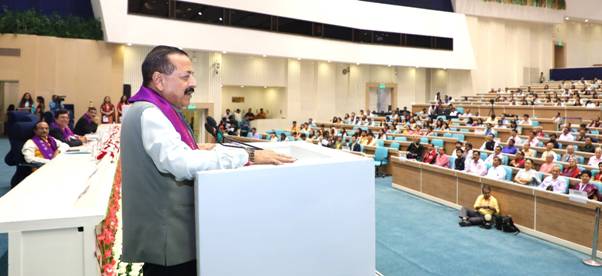Dr Jitendra Singh Highlights changing paradigm of Medical Education; Says Healthcare in India Now More Accessible and Affordable
New Delhi: Union Minister Dr. Jitendra Singh today highlighted the rapidly changing paradigms of medical education in India as also those of health care, pointing to a transformative decade that has made healthcare in India more accessible, affordable, and inclusive.
Addressing the 54th Foundation Day and College Convocation of the University College of Medical Sciences (UCMS), University of Delhi, Dr. Jitendra Singh conferred degrees upon undergraduate and postgraduate students and urged the new generation of doctors to embrace innovation while staying rooted in compassion.
The Minister observed that medical education in India has witnessed a paradigm shift in the past decade with a steep rise in the number of medical colleges and training opportunities. “Ten years ago, there were only about 45,000 undergraduate medical seats; today, the number is close to 1.5 lakh,” he said, noting that the expansion of institutions like AIIMS has democratised access to medical education across regions and enabled more women to pursue medical careers.
He described the transformation of healthcare delivery as “three-fold — accessible, affordable, and available,” crediting initiatives such as Ayushman Bharat and Jan AushadhiKendras for redefining the relationship between the state and the citizen in health matters. Sharing anecdotes from his medical career, Dr. Jitendra Singh highlighted how health insurance in India has evolved to cover pre-existing diseases — a shift he called “one of the most humane innovations” in public health policy.
Dr. Jitendra Singh also emphasised the growing global credibility of India’s life sciences sector. “It is this department — the Department of Biotechnology — that has developed the world’s first DNA vaccine for COVID-19, and the HPV vaccine for cervical cancer prevention,” he said, noting that India now supplies indigenous vaccines to over 200 countries.
Pointing to India’s first indigenous antibiotic ‘Nafithromycin’ and successful gene therapy trials for haemophilia published in the New England Journal of Medicine, Dr. Jitendra Singh said such breakthroughs reflect India’s emergence as a leader in preventive and therapeutic healthcare. He urged UCMS and similar institutions to collaborate with the private sector in conducting advanced clinical trials and research. “The age of working in silos is over,” he remarked, encouraging academic institutions to integrate with industry and government laboratories.
A Souvenir marking the institution’s 54-year journey was released on the occasion, capturing the college’s milestones in medical education, research, and public service. The publication highlighted UCMS’s growing contribution to India’s healthcare ecosystem, particularly its partnership with GTB Hospital in community-based health initiatives.
Dr. Jitendra Singh also presented awards and medals to meritorious students and faculty members in recognition of their academic excellence and contributions to medical research and teaching. The Minister congratulated the awardees and expressed confidence that India’s new generation of doctors would play a decisive role in shaping the nation’s healthcare priorities.
Reflecting on the evolving health challenges, the Minister said today’s doctors must deal with a “bi-phasic disease spectrum” — the coexistence of communicable and non-communicable diseases — alongside an ageing population and rapid technological changes. He noted that the integration of artificial intelligence in medicine, which he himself has experimented with through tele-mobile clinics, is set to redefine diagnostics and patient care. “AI can communicate in the patient’s own language and even provide comfort through human-like interaction,” he said, calling it a hybrid model that combines empathy with innovation.
Dr. Jitendra Singh concluded by reminding young graduates of their unique position in shaping the future of healthcare. “Those receiving their degrees today will be at the prime of their careers when India celebrates 100 years of independence in 2047,” he said. “Destiny has given you this opportunity to be the architects of a healthier, more self-reliant India.”
The event began with the welcome address by Prof. (Dr.) Mahesh Verma, Chairman, Governing Body, UCMS, followed by addresses by Prof. Balaram Pani, Dean of Colleges, University of Delhi and the Chief Guest. It was attended by faculty members, students, and senior officials of UCMS, also reflected the government’s broader vision to align medical education with national priorities in science, technology, and innovation.

